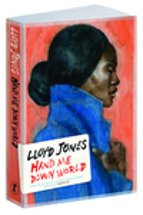Hand me down world by Lloyd Jones

Text Publishing; Melbourne, 2010. ISBN 9781921656682.
(Year 11+) Lloyd Jones's last novel was Mister Pip, a winner of
a
number of prizes, in which the main character escapes the violent
reality of life in Bougainville through the fiction of Charles Dickens,
specifically Great Expectations. His new novel Hand me down
world
is about the difference between contemporary worlds, the world of the
affluent traveled sophisticated European and the world of the colonized
and the dispossessed. The main character, who is nameless and has
nothing except a child, struggles from Tunisia to Berlin, all the time
inhabiting the world of the 'illegal' immigrant, the outsider, the
unregistered foreign national. The story starts in a resort hotel in
Africa. From the first the reader sees her, and the African staff,
trained to be self-effacing, to have no personal wishes or desires, to
leave their personal stories very definitely behind and simply to serve
others. Europeans travel to Africa, to sunbake, to swim, to fornicate.
The woman, later known as Ines, continues to serve even as she
discovers wishes and needs of her own, and as she develops her own
subversive life. She becomes a woman rather than a servant and in due
course a mother who, when she loses her child through betrayal, learns
how to use others to feed her needs. 'Africa' now struggles to Europe,
almost drowns, walks, climbs, starves, and meets with incidental
kindness, accidents and cruelty. On the journey she meets a
cross-section of European life, for example Italian partisans, the
snail collector, a truck driver, a movie researcher, a performer of
Rilke's poetry and a police inspector. The existence of the other
world, the hand me down world, is made explicit in Berlin, where the
displaced climb through the divide of a wall to a squat that harbours
whole families as well as individuals who have little. Ines is a
beautiful and charismatic woman, it seems, despite having little
language, and this helps her in many situations, except for when she is
employed by a blind man who she robs in her desperation to find her
child.
The story is told through the eyes of those who come into
contact with her, whether fleetingly or constantly, and is
reconstructed by a police inspector who becomes involved with her
situation and intervenes on her behalf. This dedication is quite hard
to believe; more disappointingly, the voices of all the characters,
including Ines herself when she speaks, all sound the same, quite
detached, which is reasonable perhaps as they are giving testimony of a
kind, but sadly lacking in individuality. However, this is an
easy-to-read novel that captures the plight of the 'illegal' immigrant
in a thought provoking and sensitive way.
Jenny Hamilton